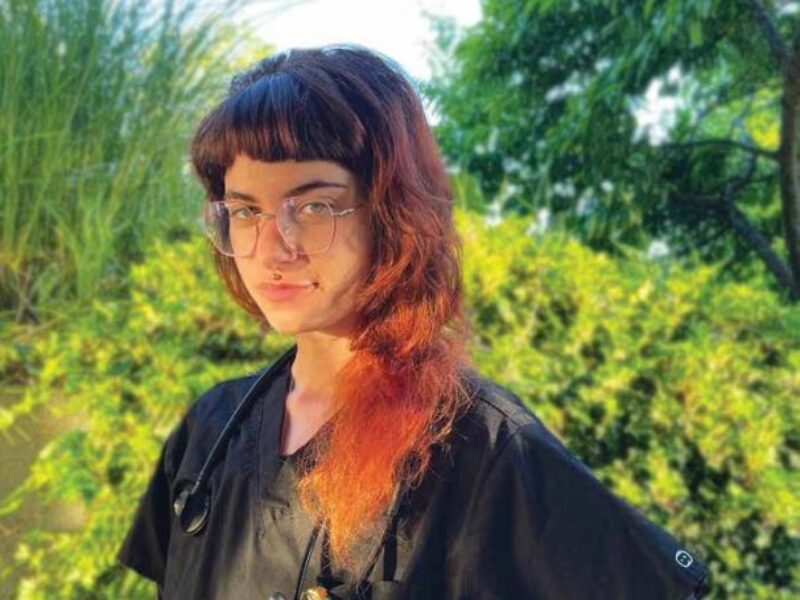Rhett Small '14
Rhett Small ’14 is living their dream nursing birds, wildlife, and other exotic animals back to health, but their path to that dream followed an unexpected route.
A Biology major, Small worked as the Poultry Crew Manager on the Farm Crew at Warren Wilson and volunteered with various animal rescue and wildlife rehabilitation organizations. They started on the preveterinary medicine track but began to have doubts— pre-vet students at other schools insisted that wildlife rescue and rehabilitation was not a viable veterinary career.
“I had assumed that I wanted to be a veterinarian, working with wildlife,” Small said, explaining that they had been very attached to the concept of becoming a doctor. Thankfully, after a tear-filled career advising session with Wendy Seligmann, MBA, the Associate Dean of Career Development, Small realized that the aspects of working with wildlife that they loved were rehabilitation or nursing skills—not doctor skills.
Seligmann suggested reaching out to people doing what Small wanted to do to find out how they got there. It turned out that many wildlife center directors started as certified veterinary technicians.
That route proved fruitful. After Warren Wilson, Small earned their Associates in Assisted Sciences, Veterinary Technology. Then they landed their dream job as a certified veterinary technician at the South Florida Wildlife Center (SFWC), a robust wildlife hospital treating over 13,000 animals a year.
One memorable day, “someone brought in this giant dog crate with what sounded like a tiger in it,” Small said. It turned out to be a bobcat with a bad carpal fracture. Other days, it was a pocket full of baby opossums, an armadillo hit by a car that they sewed up with a tapestry needle, or shell repairs on a turtle, which are “practically carpentry, with all of the drills, screws, and hardware involved,” Small said. Hook removals on pelicans meant reaching an entire arm into the anesthetized bird to scoop out its stomach contents. “One time someone found a flip flop!” Small said.
Some of Small’s favorite patients were frigate birds. “Those birds are never really supposed to touch the ground,” Small said. “They have these teeny tiny little legs, and they mostly coast through the air their entire lives— they sleep in the air, do everything in the air. They come down only to mate on little cliffsides once a year, and the rest of their lives are spent soaring. So to see them on the ground in the clinic is, medically, like dealing with an alien.”
Small said people frequently ask, “Why intervene when a wild animal is dying? Isn’t that just interrupting the cycle of life?” But about 90 percent of the animals treated at the center had ailments caused by humans, whether direct or indirect. “The harm has already been caused and is never going to go away,” Small said, “but if I can make it a little bit better, I would like to try.”
Small spent three years working for the SFWC, but its funding was abruptly reduced in 2020. In the resulting layoffs, Small suddenly lost their dream job. Though leaving the center broke Small’s heart, veterinary work was plentiful during the COVID-19 pandemic. After a short stint at a veterinary neurology practice, Small landed a new job in Seattle at the Center for Bird and Exotic Animal Medicine, the only 24-hour emergency exotic animal veterinary clinic in Washington.
“I wasn’t sure how I would feel, not doing wildlife in particular,” Small said, “but I’m really happy to work with birds again. I have a lot to learn. I have a lot to give. And I have a lot of animals to help, which is what I do.”

- Profession
- Wildlife Veterinarian
- Major
- Biology
- Work Crew
- Farm Crew - Poultry Crew Manager
- Service Experience
- Volunteered at Wildlife Rehabilitation and Animal Rescue Organizations
